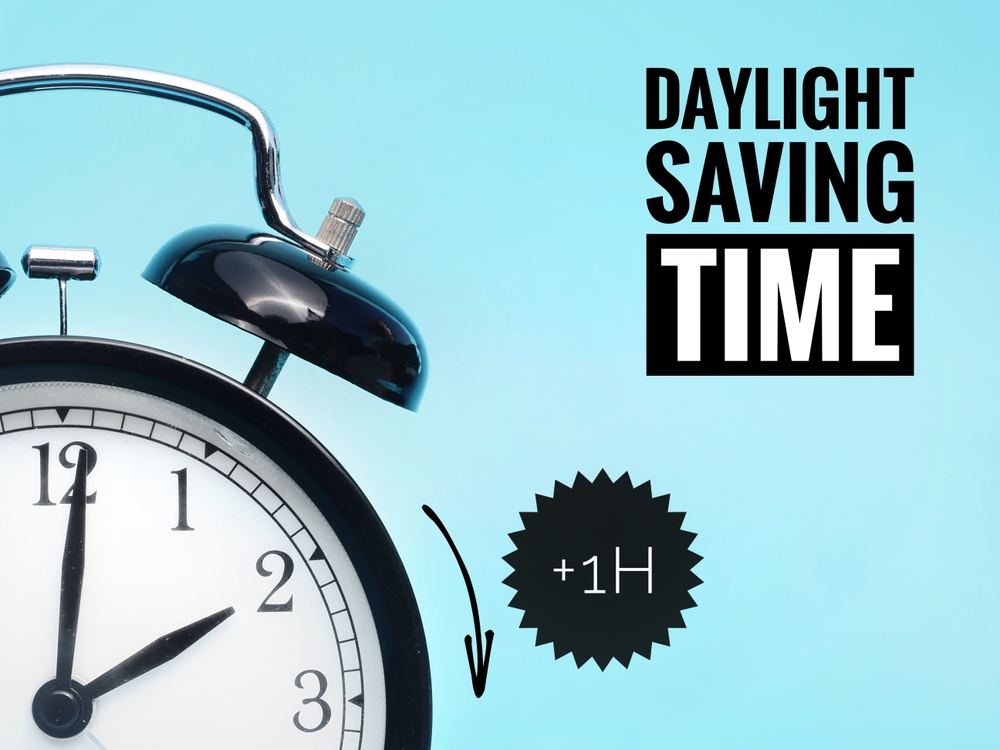1. Your Sleep Cycle Gets Thrown Out of Whack

It’s amazing how much an hour can mess with your body. When you set the clock forward or backward, your brain doesn’t just adjust instantly. Your body has an internal clock, known as the circadian rhythm, which regulates when you feel sleepy and when you wake up. That rhythm is largely controlled by light exposure, so when the time shift happens, it disrupts the signals your brain relies on to decide when it’s time for bed. This is why so many people feel groggy, sluggish, and even irritable for days after a time change.
The problem doesn’t just stop at feeling a little sleepy. A misaligned sleep cycle can lead to trouble falling asleep at night, waking up too early, or tossing and turning throughout the night. The worst part? It doesn’t just affect one night—it can take a full week for your body to recalibrate. For some, this disruption can lead to insomnia, increased stress, and even mood swings. One way to ease the transition is by gradually adjusting your sleep schedule a few days before the clock change. Going to bed 15 minutes earlier or later each night can help your body adjust more smoothly instead of being thrown into a sudden shift.
2. Your Mood and Mental Health Take a Hit

It’s not just your sleep that suffers—your mood can take a serious nosedive too. Many people report feeling more irritable, anxious, or even mildly depressed after a time change. A big reason for this is that lack of sleep affects the brain’s ability to regulate emotions. When you’re tired, your brain is less equipped to handle stress, making small problems feel much bigger than they actually are. You may find yourself snapping at coworkers, feeling overwhelmed by tasks that usually feel easy, or just experiencing a general sense of unease.
There’s also a seasonal component to this. The fall time change, in particular, means less evening sunlight, which can contribute to seasonal affective disorder (SAD). This type of depression is linked to reduced exposure to natural light, which affects serotonin levels—the neurotransmitter responsible for mood stabilization. To counter this, getting outside during daylight hours can help. Even just 15 minutes of natural sunlight in the morning can help regulate your mood and keep your internal clock in check. If you’re still struggling, light therapy lamps are a great option to mimic natural sunlight and keep your mood balanced.
3. Your Heart and Immune System Feel the Strain

It might surprise you, but something as simple as changing the clocks has been linked to an increase in heart attacks and strokes. Studies have shown that in the days following a time change—especially in the spring—there is a noticeable spike in cardiovascular events. The reason? Disrupting sleep patterns and circadian rhythms affects blood pressure, stress hormones, and overall heart health. Even losing just one hour of sleep can put extra strain on the body, leading to higher inflammation and a temporary increase in heart attack risk.
Your immune system also takes a hit. Quality sleep is essential for keeping your body’s defense mechanisms strong. When sleep is disrupted, your immune system produces fewer infection-fighting cells, making you more vulnerable to colds, flu, and other illnesses. This is why many people find themselves feeling run down in the days after a time change. To protect your heart and immune system, staying hydrated, maintaining a consistent sleep schedule, and managing stress levels can make a big difference. Gentle exercise and a diet rich in antioxidants can also help your body recover more quickly from the effects of the shift.
4. Productivity and Focus Take a Dive

Ever feel like your brain is in a fog the day after a time change? That’s because sleep deprivation—no matter how small—affects cognitive function. Memory, concentration, and decision-making skills all suffer when your body is trying to adjust to a new schedule. This is especially noticeable in workplaces, where studies have found an increase in errors and accidents in the days following a clock change. Even if you don’t feel overly tired, your reaction times and ability to think clearly can still be impaired.
This effect is particularly concerning for people in high-stakes jobs, like healthcare professionals, pilots, and truck drivers, where a small lapse in focus can have serious consequences. The best way to combat this is by prioritizing sleep in the days leading up to the change. Reducing screen time before bed, avoiding caffeine late in the day, and establishing a relaxing bedtime routine can help your brain adjust more smoothly. If you’re struggling to stay focused, taking short breaks, drinking plenty of water, and stepping outside for fresh air can also give your brain the reset it needs.
5. Your Digestion and Appetite Get Thrown Off

Your stomach has its own internal clock, too, and when you suddenly shift your schedule, your digestion and metabolism can feel the impact. Many people notice they feel hungrier or less hungry at odd times after a time change. This is because your body’s release of hunger-related hormones, like ghrelin and leptin, is tied to your circadian rhythm. When that rhythm is disrupted, it can make you crave unhealthy foods, feel sluggish after meals, or even experience digestive discomfort.
The timing of meals is also crucial for digestion. When your eating patterns shift suddenly, your gut bacteria and enzymes don’t always keep up right away, leading to bloating, acid reflux, or irregular bowel movements. The best way to minimize these effects is to keep your meal times as consistent as possible, even when the clocks change. Eating a balanced diet rich in fiber and probiotics can also help your digestive system adjust more easily. If you find yourself craving junk food, opting for protein-rich snacks can help stabilize blood sugar levels and keep you feeling more balanced throughout the transition.
6. Mood Swings and Irritability Spike

If you’ve ever felt unusually grumpy or emotional after a time change, you’re not alone. Sleep and mood are deeply connected, and even a small disruption can trigger increased irritability, anxiety, or sadness. The reason lies in how the brain regulates serotonin and cortisol—two key hormones that control mood and stress levels. When sleep is thrown off balance, serotonin production can dip, making you feel more emotionally vulnerable. At the same time, cortisol, the body’s stress hormone, can spike, leading to heightened anxiety and frustration.
This emotional rollercoaster can be especially difficult for those already prone to mood disorders like depression or seasonal affective disorder (SAD). The sudden shift in daylight exposure plays a role, too, as less morning sunlight can impact your body’s natural ability to produce serotonin. To combat these mood swings, try getting outside early in the morning to soak up natural light, which helps regulate your internal clock. Regular exercise, mindful breathing, and keeping a consistent bedtime routine can also help stabilize emotions and prevent those post-time-change blues.
7. The Risk of Car Accidents Increases

Every year, data shows a sharp rise in car accidents in the days following a time change, especially in the spring. The combination of sleep deprivation, grogginess, and darker mornings makes for a dangerous mix on the road. Reaction times are slower, attention spans are shorter, and drivers are more likely to make mistakes. Even a one-hour sleep loss can significantly impact a person’s ability to focus while driving, increasing the risk of collisions.
Pedestrians and cyclists are also at higher risk during this period because drivers are adjusting to different light conditions. Commuters who are used to driving in daylight may suddenly find themselves in darkness, making it harder to see people crossing the street. The best way to stay safe is to be extra cautious when driving in the days following the change. Getting enough sleep, leaving earlier to avoid rushing, and minimizing distractions like phone use can help reduce the risk of accidents. If you’re feeling groggy, opting for public transportation or carpooling can also be a safer choice.
8. Sleep Quality Suffers for Days or Even Weeks

It’s easy to assume that your body will adjust to the time change after just a day or two, but for many people, the effects linger much longer. Your internal clock doesn’t simply reset overnight—it can take days or even weeks to fully adjust, especially if you already struggle with sleep. During this period, sleep tends to be lighter and more fragmented, meaning you wake up more often during the night and spend less time in deep, restorative sleep.
This lack of quality rest can have a domino effect on your overall health, affecting everything from memory and energy levels to immune function and metabolism. The good news is that there are ways to ease the transition. Gradually shifting your bedtime in the days leading up to the change can help your body adjust more smoothly. Avoiding naps longer than 20 minutes and keeping your bedroom cool, dark, and quiet can also improve sleep quality. If you find yourself struggling to fall asleep, relaxation techniques like reading or gentle stretching before bed can make a big difference.
9. Kids and Pets Struggle to Adjust

If you think adjusting to the time change is tough for you, imagine how confusing it is for kids and pets. Their routines are built around consistency, and even a small shift in mealtime, bedtime, or playtime can throw them off. Many parents notice that young children have trouble falling asleep, wake up too early, or seem extra cranky after a time change. This is because their internal clocks are more sensitive to disruptions, making it harder for them to adapt quickly.
Pets experience a similar struggle. Dogs and cats, for example, expect to be fed and taken outside at the same time each day. When those times suddenly shift, they may become restless, beg for food earlier or later than usual, or even show signs of mild anxiety. The best way to help both kids and pets adjust is to make changes gradually. Shifting their schedules by 10–15 minutes each day leading up to the time change can make the transition smoother. Providing extra comfort, playtime, and reassurance can also help them feel more secure during the adjustment period.
10. The Debate Over Time Changes Continues

With all the disruptions that come with changing the clocks, it’s no surprise that many people question whether we should still be doing it. The practice of daylight saving time was originally introduced to conserve energy, but modern research suggests that the benefits may no longer outweigh the downsides. Many experts argue that the negative effects on sleep, health, and productivity are too significant to ignore. Some regions have already abolished time changes altogether, opting to stay on one permanent schedule year-round.
The debate over whether to keep or eliminate daylight saving time continues in many countries, with lawmakers weighing the pros and cons. While some people appreciate the extra evening daylight, others believe the health risks and inconvenience outweigh the advantages. Until a final decision is made, the best thing you can do is prepare yourself for the inevitable adjustment. Prioritizing sleep, maintaining a steady routine, and allowing your body time to adapt can help you navigate the transition with as little disruption as possible.


